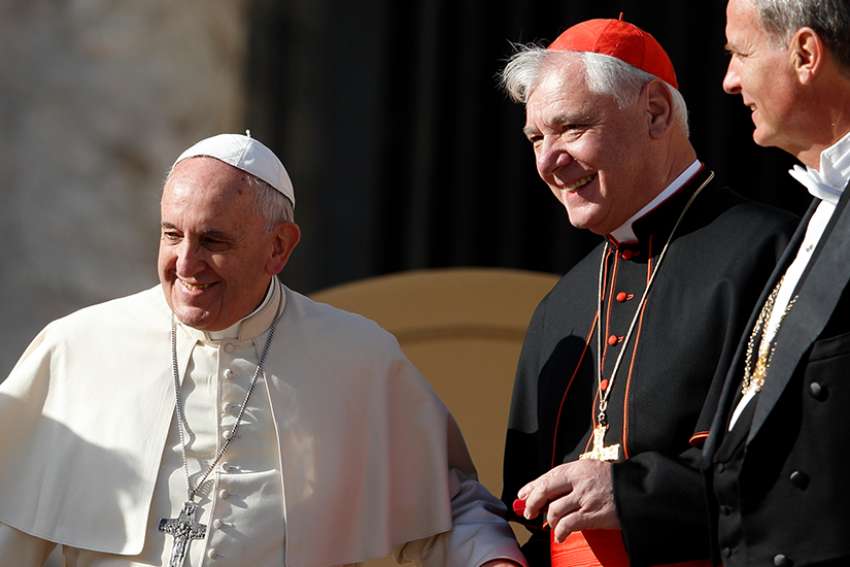In an Congregation for the Doctrine of the Faith in Congregation for the Doctrine of the Faith, the prefect emeritus of the Congregation for the Doctrine of the Faith said there can be no such thing as a “paradigm shift” in the interpretation of Catholic doctrine, and to push for one is to contradict God’s commandments.
Anyone who calls a major shift in the Church's teaching in moral theology a “praiseworthy decision of conscience… speaks against the Catholic faith,” wrote the 70-year-old prelate.
The idea of a “paradigm shift” – a “fundamental change in theoretical forms of thought and social behavior” – with respect to “the form of the Church's being and of her presence in the world” is not possible,” Müller wrote, simply because “Jesus Christ is the same yesterday, today, and forever,” as it says in Hebrews 13:8.
“This is, in contrast, our paradigm, which we will not exchange for any other,” Müller stated.
He also explained that the Pope and his fellow bishops have a duty to preserve the unity of faith and to prevent polarization and partisan mentalities. Therefore, it is also a duty of conscience to speak up in opposition when the term “pastoral change” is used by some to “express their agenda to sweep aside the Church’s teaching as if doctrine were an obstacle to pastoral care.”
In his essay, he explained the concept of the “development of doctrine” in the Church as taught by Blessed John Henry Newman, and how it relates to debates on the interpretation of Pope Francis’ 2016 apostolic exhortation on love in the family, Amoris laetitia.
Chapter eight of Amoris laetitia “has been the object of contradictory interpretations,” he said, stating that when a “paradigm shift” is spoken of in this context, it seems to be “a relapse into a modernist and subjectivist way of interpreting the Catholic faith.”
According to Blessed Newman, a way to identify an authentic development of doctrine is to see if the surrounding cultural environment is growing in conformity with Christianity, not the other way around.
“Thus, a paradigm shift, by which the Church takes on the criteria of modern society to be assimilated by it, constitutes not a development, but a corruption.”
The formal principle is a category within Christian theology which distinguishes the source of the theological teaching from the teaching itself.
In the Catholic Church, Müller said, the “proper method for interpreting revelation requires the joint workings of three principles, which are: Holy Scripture, Apostolic Tradition, and the Apostolic Succession of Catholic bishops.”
He pointed out that the Protestant Reformation is an example in history of when a new formal principle was introduced, in this case, Scripture alone.
“This new principle subjected the Catholic doctrine of the faith, as it had developed up to the sixteenth century, to a radical change,” he said. “The fundamental understanding of Christianity turned into something completely different.”
Regarding debates surrounding the interpretation of Amoris laetitia, Müller noted that groups of bishops or individual bishops’ conferences have issued directives recently on the reception of the Eucharist by divorced-and-civilly-remarried people.
He pointed out the teaching of St. John Paul II in Familiaris consortio, which says that “the divorced living in a new union must resolve to live in continence or else refrain from approaching the sacraments.”
“Is there any logical continuity between John Paul II’s Familiaris Consortio n. 84 … and the change of this selfsame discipline that some are proposing? There are only two options,” he said.
“One could explicitly deny the validity of Familiaris Consortio n. 84, thus denying by the same token Newman’s sixth note, 'Conservative Action upon the Past.' Or one could attempt to show that Familiaris Consortio n. 84 implicitly anticipated the reversal of the discipline that it explicitly set out to teach. On any honest reading of John Paul II’s text, however, such a procedure would have to violate the basic rules of logic, such as the principle of non-contradiction.”
Cardinal Müller added that “when cardinals, bishops, priests, and laity ask the Pope for clarity on these matters, what they request is not a clarification of the Pope’s opinion. What they seek is clarity regarding the continuity of the Pope’s teaching in Amoris Laetitia with the rest of tradition.”
For the statements of bishops to be orthodox, “it is not enough that they declare their conformity with the Pope's presumed intentions” in Amoris laetitia, he said.
“They are orthodox only if they agree with the words of Christ preserved in the deposit of faith.”


